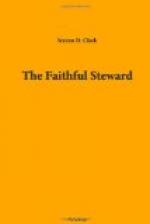PART II.
Systematic beneficence is capable of a twofold division. There is a general or universal system, binding indiscriminately and equally on all of every rank and condition; and a particular system adapted alone to the circumstances of each individual. The latter stands related to the former, as the edifice to the foundation on which it rests. This distinction must be kept clearly before mind, if we would have definite views of our obligations relative to this important subject. In the ensuing discussion, I shall confine myself mainly to the general system; believing that if God’s people are correct in sentiment, rooted and grounded in moral and christian principles, they will be substantially correct in practise. And as the particular or individual system grows, by a moral necessity, out of the other when fully embraced, being, in fact, involved in the practical part of it, I propose to give but occasional hints concerning it.
Practically considered, a system of beneficence consists in two things: the amount of property bestowed, and the frequency of stated gifts to the Lord.
Before detailing in full, therefore, the general system of beneficence, these two questions must be thoroughly discussed—1. What is the proportional amount of property or income to be given in charitable contributions? 2. How frequently should stated contributions be made?
The first of these is a point the most difficult for the depraved heart to reach. Self-interest clamors most loudly for the smallest sum possible. Her whole strength must here be encountered. But selfishness, properly so called, has nothing to do with the question. The rule determining the amount must be fixed upon, not only entirely without her aid, but in direct opposition to her insidious suggestions. It must also be a rule growing out of those principles which take hold of, and bind the conscience; and therefore clearly taught in the Bible. This is a consideration which may not be overlooked. If we endeavor to deduce a rule from principles not found nor recognized in the Scriptures, the influence will be disastrous; we shall rather strengthen, than weaken, the covetous tendencies of the heart.
It has appeared to some of vast importance to fix upon a definite amount of income as each one’s yearly contribution. A tenth has been named as the proportion divinely approved, in imitation of Jacob’s vow to give a tenth to God of all that he should receive at his hand; and because the Jews were required to pay a tithe of their yearly increase for the support of the Levites. Arguments have been adduced to show that this ratio in charity is obligatory on all; at the same time, it has been acknowledged not to be enjoined in the New Testament. We think, however, the ground untenable; and all efforts to designate this or any other fixed proportion as universally binding, both inexpedient and unscriptural.




